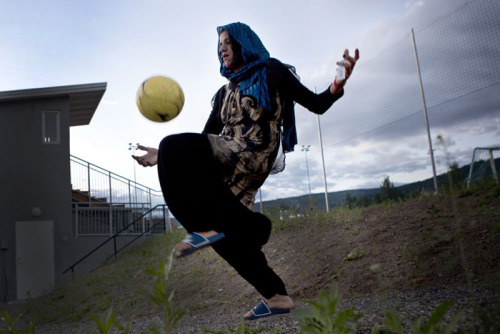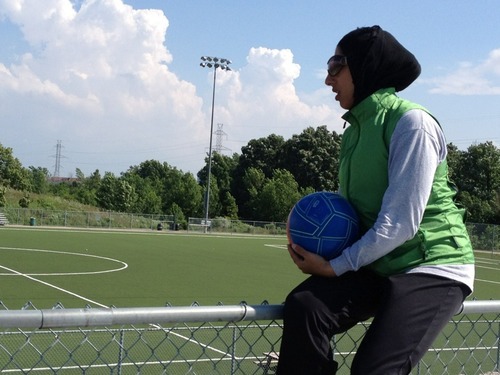Women in Saudi Arabia will reportedly be allowed to attend sporting events in stadiums next year, according to reports.
They will be allowed into stadiums in the major cities of Riyadh, Jeddah and Dammam, the BBC reports.
The news come as Saudi Crown Prince Mohammed bin Salman continues to chart a more modern course for the conservative country, which for decades had banned concerts and film screenings and arrested women who attempted to drive.
Since catapulting to power with the support of his father, the king, the prince has pushed forth changes that could usher in a new era for one of the United States' most important allies and swing the kingdom away from decades of ultraconservative dogma and restrictions.

He's introduced musical concerts and movies again and is seen as the force behind the king's decision to grant women the right to drive as of next year.
Opposition to the changes has so far been muted, but some of the prince's critics have been detained.
The prince's agenda is upending the ruling Al Saud's longstanding alliance with the kingdom's clerical establishment in favour of synchronising with a more cosmopolitan, global capitalism that appeals to international investors and maybe even non-Muslim tourists.
The prince grabbed headlines in recent days by vowing a return to "moderate Islam".
He also suggested that his father's generation had steered the country down a problematic path and that it was time to "get rid of it."

In his sweeping "Vision 2030" plan to wean Saudi Arabia of its near total dependence on petrodollars, Prince Mohammed laid out a vision for "a tolerant country with Islam as its constitution and moderation as its method".
Prince Mohammed, or MBS as he is widely known, used a rare public appearance on stage at a major investor conference in the capital, Riyadh, this week to drive home that message to a global audience.
"We only want to go back to what we were: Moderate Islam that is open to the world, open to all religions," he said.
"We will not waste 30 years of our lives in dealing with extremist ideas. We will destroy them today."
His remarks were met with applause and a front-page article in Britain's The Guardiannewspaper.
In expanded remarks to the paper, the 32-year-old prince said that successive Saudi monarchs "didn't know how to deal with" Iran's 1979 revolution that brought to power a clerical Shiite leadership still in place today.
That same year, Saudi rulers weathered a stunning blow: Sunni extremists laid siege to Islam's holiest site in Mecca for 15 days.

The attack was carried out by militants opposed to social openings taking place at the time, seeing them as Western and un-Islamic.
Indeed, Sunni extremists have used the intolerant views propagated by the ideology known as Wahhabism to justify violence against others. Wahhabism has governed life in Saudi Arabia since its foundation 85 years ago.
The ruling Al Saud responded to the events of 1979 by empowering the state's ultraconservatives. To hedge the international appeal of Iran's Shiite revolution, the government backed efforts to export the kingdom's foundational Wahhabi ideology abroad.
To appease a sizeable conservative segment of the population at home, cinemas were shuttered, women were banned from appearing on state television and the religious police were emboldened.
Much is now changing under the prince as he consolidates greater powers and prepares to inherit the throne.
There are plans to build a Six Flags theme park and a semi-autonomous Red Sea tourist destination where the strict rules on women's dress will likely not apply.
Females have greater access to sports, the powers of the once-feared religious police have been curtailed and restrictions on gender segregation are being eased.
Unlike previous Saudi monarchs, such as King Abdullah who backed gradual and cautious openings, Prince Mohammed is moving quickly.
More than half of Saudi Arabia's 20 million citizens are below the age of 25, meaning millions of young Saudis will be entering the workforce in the coming decade.
The government is urgently trying to create more jobs and ward off the kinds of grievances that sparked uprisings in other Arab countries where unemployment is rampant and citizens have little say in government.
The prince has to find solutions now for the problems he is set to inherit as monarch.
"What MBS is doing is a must requirement for any kind of economic reform. Economic reform requires a new Protestant ethic if you will, a new brand of Islam," said Maamoun Fandy, director of the London Global Strategy Institute.
This new Saudi version of "moderate Islam" can be understood as one that is amenable to economic reforms; it does not close shops at prayer time or banish women from public life, Fandy said.
In other words, Saudi Arabia's economic reforms require social reforms to succeed.
Buzzwords like "reform," ''transparency" and "accountability" — all used by the prince in his promotion of Vision 2030 — do not, however, mean that Saudi Arabia is moving toward greater liberalism, democracy, pluralism or freedom of speech.
The government does not grant licenses to non-Muslim houses of worship, and limits those of its Shiite Muslim citizens.
The prince has also made no mention of human rights concerns. If anything, dozens of the prince's perceived critics have been detained in a warning to others who dare to speak out.
Some of those arrested were seen as critics of his foreign policies, which include severing ties with Qatar, increasing tensions with Iran and overseeing airstrikes in Yemen that have killed scores of civilians and drawn sharp condemnation from rights groups and some in Washington.
Meanwhile, Prince Mohammed faces a Saudi public that remains religiously conservative. That means he still needs public support from the state's top clerics in order to position his reforms as Islamic and religiously permissible.
These clerics, many of whom had spoken out in the past against women working and driving, appear unwilling or unable to publicly criticize the moves.
In this absolute monarchy, the king holds final say on most matters and the public has shown it is welcoming the changes.
With Associated Press.
Source: http://www.9news.com.au/world/2017/10/30/11/21/saudi-women-to-be-allowed-into-sport-stadiums
Source: http://www.9news.com.au/world/2017/10/30/11/21/saudi-women-to-be-allowed-into-sport-stadiums













